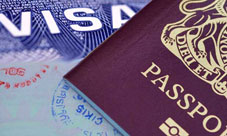
Georgia’s EU Ambassador Names Countries Concerned by Georgian Asylum Seekers
By Gvantsa Gabekhadze
Thursday, January 25
(BRUSSLES)--Sweden and Iceland raised the issue of significant rise of asylum seekers from Georgia at the Visa Group meeting in Brussels, the Ambassador of Georgia to the European Union Natalie Sabanadze said.
The ambassador stated she did not attend the meeting because it was not open for third countries.
"As far as I know, it is not particularly worrying about Georgia. There were two countries that raised the issue that the number of asylum seekers increased significantly from Georgia. These countries are Sweden and Iceland,” Sabanadze said.
Sabanadze claims that the visa-free regime suspension mechanism for Georgian citizens is not discussed yet.
The Radio Liberty reported that the Visa Group in the EU expressed concern over two countries - Georgia and Albania.
At the same time, none of the European Union countries has requested to stop visa free travel with Georgia, but this issue should be considered as a warning.
Sabanadze admitted that the number of Georgian asylum seekers to the EU states has increased but not as greatly to cause the concern of the European Union (EU).
The visa-free regime for Georgia was activated on March 28, 2017.
Georgians holding biometric passports are now able to enter the Schengen Area for 90 days within any 180-day period for vacation, business, or any other purpose except work.
Georgians can travel without visas to the 22 EU member states, also to four non-EU-member states (Iceland, Liechtenstein, Norway and Switzerland) as well as four Schengen candidate countries (Bulgaria, Cyprus, Romania and Croatia).
Exceptions for visa-free travel include Ireland and the United Kingdom.
Georgians will lose the freedom to travel visa-free if they suddenly start making numerous asylum requests, stay in the Schengen Zone for more than 90 days at a time or cause an increase in risks and internal security.
If such problems emerge, the suspension of visa-free regime can be extended up to 18 months, followed by the intervention of the European Parliament.


